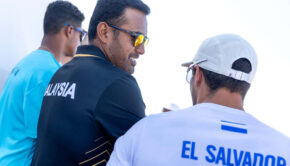Quality control for Olympic classes
Published on July 26th, 2019
The concept of one design racing is to level the playing field such that the equipment provides similar speed, and it is the ability of the sailor that is tested. However, regardless of the one design class, not all equipment is always considered level.
While McDonalds may be able to provide consistent hamburgers, equipment suppliers don’t always fare so well.
To address this issues, as part of the process of finalizing the equipment for the Paris 2024 Olympic Games, World Sailing reports how they are introducing new quality control processes for all Olympic Classes to ensure the technical integrity of the sport can be assured.
Based upon feedback from Sailors, Coaches, and Member National Authorities (MNAs) it has become clear that one-design equipment is not always being delivered to an absolutely consistent standard, when one-design is meant to ensure that the equipment is identical.
Sailors are having to purchase and test multiple components to ensure that they are sailing, what they believe to be the best performing boat. This leads to increased Olympic campaign costs for Olympic Sailors.
MNAs first raised this at the 2016 World Sailing Annual Conference and at subsequent meetings, and as a result World Sailing is committed to addressing this issue to reduce costs and to protect the integrity of the sport for all stakeholders.
The plan is for an independent quality control process to be put in place to promote technological improvements and ensure the technical integrity of the Class. The new independent quality control processes will be funded through a fee of up to 1% levied on the manufacturers. The manufacturers fee for each Class will only fund quality control processes for that particular Class.
At the end of each year, the actual costs will be transparently reported back to the manufacturer and any surplus fee for that Class will be refunded to the manufacturers. The fee will then be reviewed on a Class by Class basis for subsequent years (again, up to a maximum level of 1%) to ensure that the right fee level is set going forward.
The quality control checks for each Olympic Class are different and it is expected that ultimately the fee will vary by Class once the first year of inspections is complete.
The new independent quality control process will include all main equipment items on the boat which need to be controlled, and not just hulls. The manufacturers fee is entirely different to the World Sailing plaque fees, which relate to all World Sailing Classes and are approximately 0.2% of the retail price of the boat.
The World Sailing plaque fees provides a plaque that is applied to the hull and does not serve to control quality. It is for this reason that this Olympic specific policy is within the Olympic Classes contract.
All Olympic Classes have already signed a version of the Olympic Classes contract that includes the provision of the manufacturers fee and contracts are being updated to include the Olympic equipment FRAND principles that have now become World Sailing policy.
The independent quality control is to ensure that sailors and MNAs are getting what they are paying for. World Sailing is confident that these steps will further protect the integrity of the sport.








 We’ll keep your information safe.
We’ll keep your information safe.